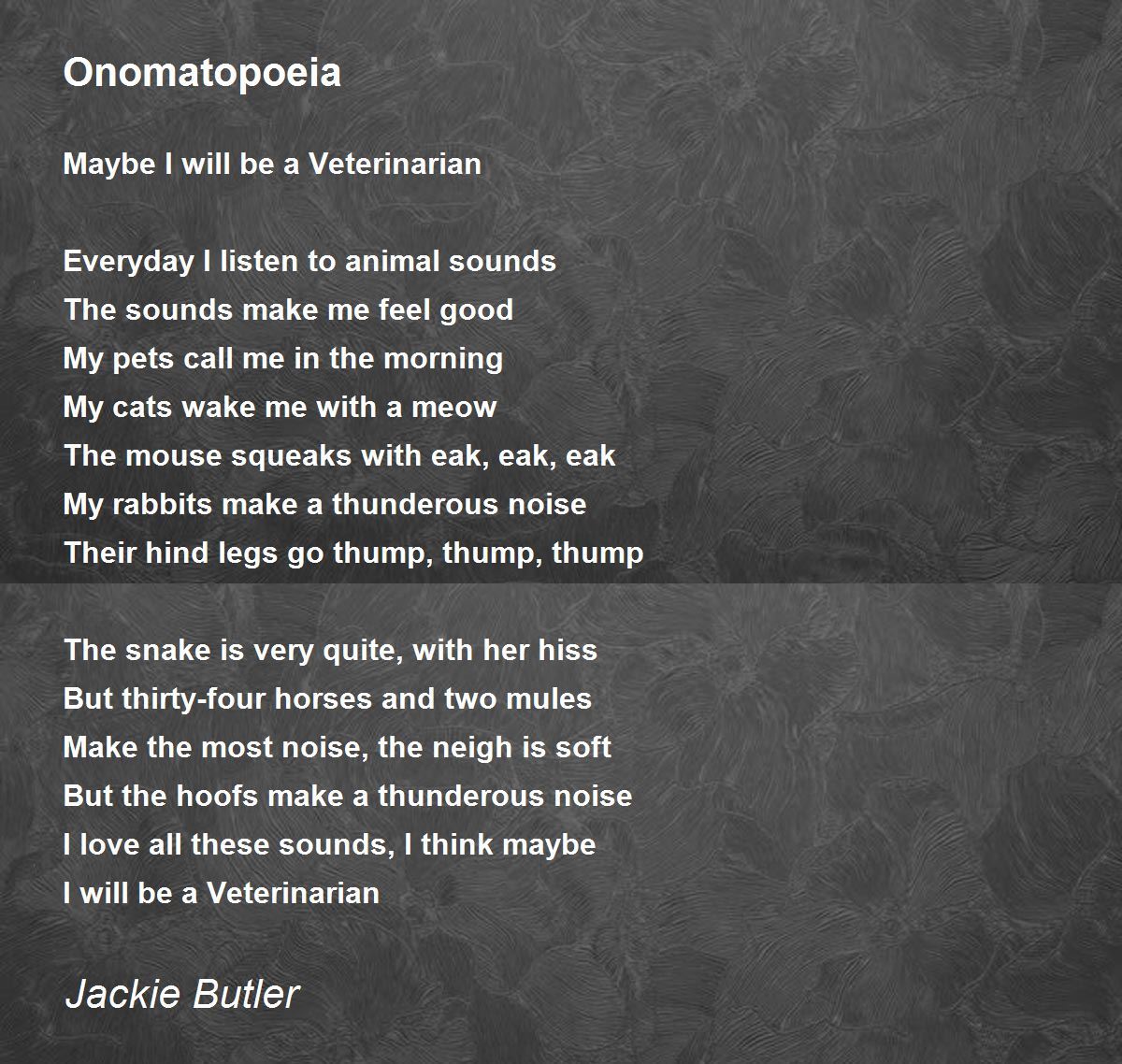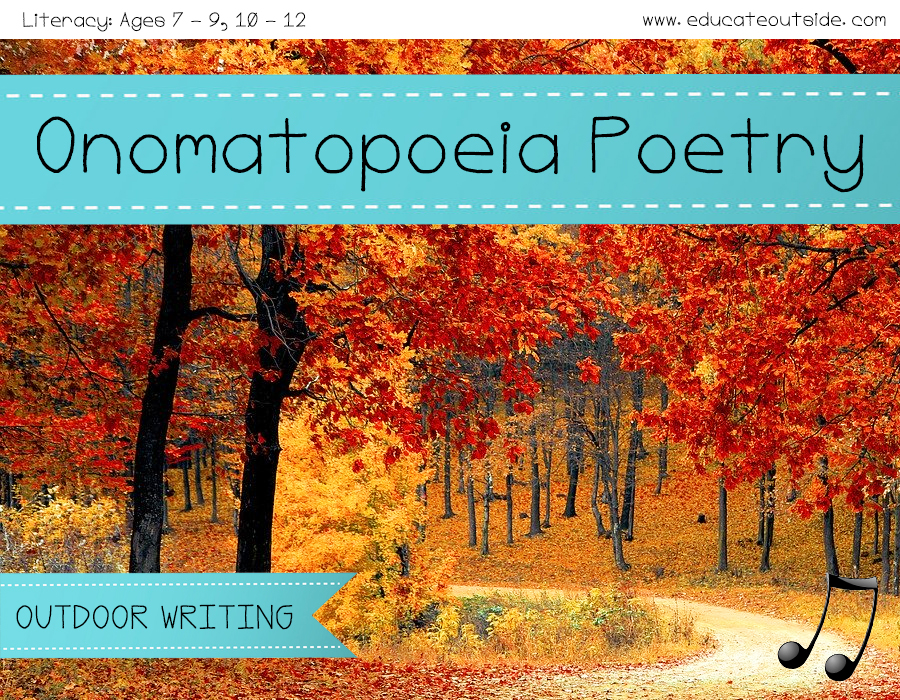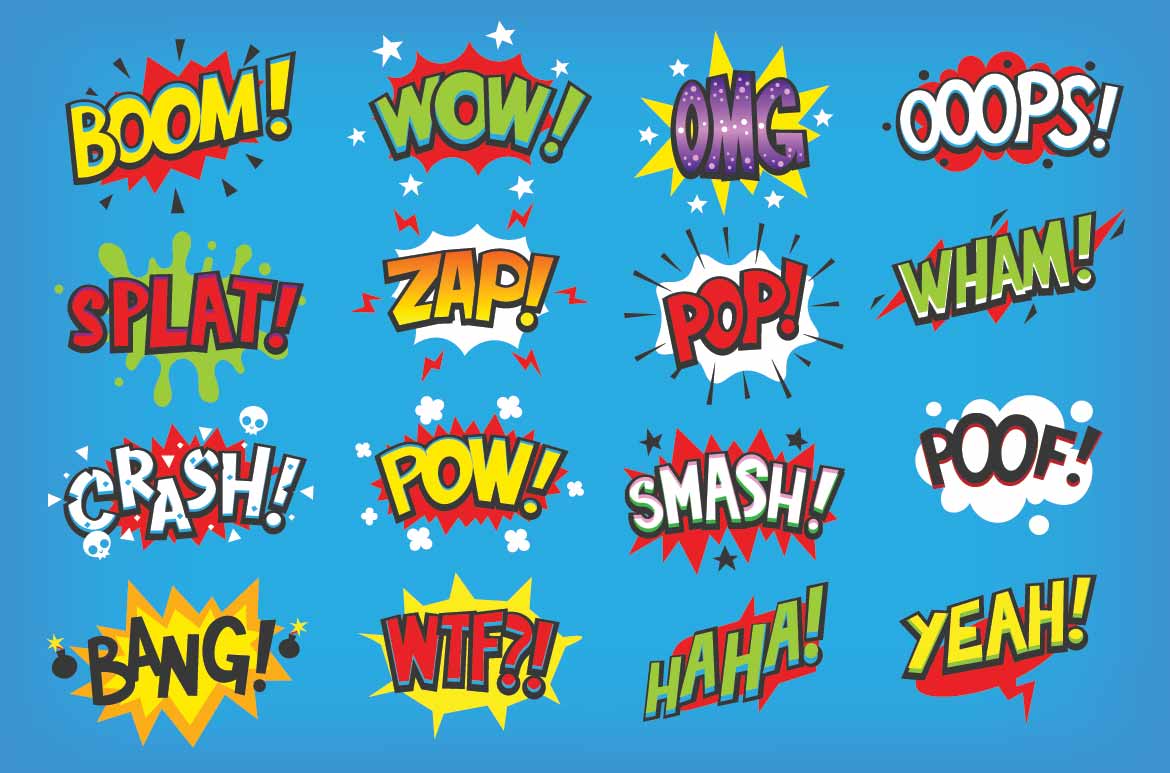
77 Awesome Onomatopoeia Poems for Kids Poems Love For Him
Onomatopoeia is a poetic device that involves the use of words that imitate sounds. This technique can be found in famous poems such as Edgar Allan Poe's 'The Bells,' where the sound of the bells is repeated in the onomatopoeic words 'tinkle,' 'clang,' and 'moan.'

Onomatopoeia Onomatopoeia Poem by Jackie Butler
Categories: onomatopoeia, nonsense, silly, Form: Limerick. Onomatopoeia. The time of the clock, The ships are in the dock, The whistle of the wind, Through the haughty tamarind, Now I can't think 'cause it's summer, don't mock. 06/09/2020.

8 Pics Onomatopoeia Poems For Kids And Review Alqu Blog
There are many examples of onomatopoeia in poems. This lesson gave you one short example about fireworks, but see if you can find some others. Read some onomatopoeia poems carefully..

Teaching Onomatopoeia Poems For Teenagers High school english
Onomatopoeia is the use or format of words whose sounds imitate their meanings (ex: buzz, honk, boom). Shout it Out Loud. Onomatopoeia is an awesome poetry device because it adds depth to writing, but the sounds can only be heard when you speak them. Hear the difference for yourself: read the word "woof." Now try speaking it. Now a little louder.

Great poem for Onomatopoeia Language Arts Lessons, Language Teaching
Poetry 101: What Is Onomatopoeia? Learn How to Use Onomatopoeia in Poetry and Literature With Examples - 2024 - MasterClass Usually, how words sound bears no relationship to what they mean. That's not true in the case of onomatopoeia, where words sound like what they are.

onomatopoeia poem Poetry ideas, Poetry for kids, Teaching poetry
Using onomatopoeia in a poem can engage the reader's senses with more vivid imagery and heightened sensory impact, without having to use additional words. If your poem contains actions, it's a good idea to include onomatopoeia in your writing. Let me give you an example. Let's say you were writing a poem about skiing and you said:

Short onomatopoeia Poems
Onomatopoeia in Poems. Poets and musicians use onomatopoeia in their work in two main ways: directly and indirectly. One way is to directly or obviously use an onomatopoeic word to create atmosphere for the reader. The other way is less obvious, where words or parts of words that are used to create an onomatopoeic device, which is usually a pun, in a poem (some examples of this is given below).

Onomatopoeia Poetry Educate Outside
Onomatopoeia Examples in Poems Five original poems for children written by LoveToKnow editor, Kelly Roper. Swish Went the Fish By Kelly Roper Swish, swish, swish, Went the little goldfish As he swam around his bowl. Splash, splish, splash Went his fancy little tail Because he was a happy little soul. Glub, glub, glub Went the bubbles he blew

Great poem for Onomatopoeia Teaching themes, Elementary schools
Onomatopoeia Poems What are onomatopoeia poems? They are poems that make use of onomatopoeia, those words that sound like what they describe…for example: bang, boom, crash, tinkle, crinkle, pop, crack, sizzle, and so many more. These words paint both a visual and a sound picture for the reader.

56 Fun Onomatopoeia Examples Teaching Expertise
These top poems in list format are the best examples of onomatopoeia poems written by PoetrySoup members I Wander the Desert Alone Aimlessly I meander in expansive barren-landscape Whipped by the assault of rustling windy gales Embossing sandy designs resembling ocean waves Simulating pools of water in mirage of seascapes. Plateaus. Read More

Great poem for Onomatopoeia Dr Seuss Pinterest
Onomatopoeia is a way of increasing the poignancy of imagery in a poem, short story, or novel. These words help readers hear the sounds of words they represent. This should also mean that the reader is taken deeper into the story and is more willing to suspend their disbelief.

Short onomatopoeia Poems
Onomatopoeia is a figure of speech in which a word imitates the sound associated with an action or an object, effectively mimicking the sound it describes. Some examples of onomatopoeia are "buzz," "whack," "clang," and "cock-a-doodle-doo."

Onomatopoeia Poems
Poetry often uses onomatopoeia words because they are so descriptive. This type of word helps us to imagine the story or scene that is happening in the poem. Here are two examples that show how famous poets have used onomatopoeia in their poems. In these poem excerpts, the onomatopoeia words are underlined. Meeting at Night (by Robert Browning)

Short onomatopoeia Poems
Explore the glossary of poetic terms. Onomatopoeia is the use of language that sounds like the thing or action it describes. History of Onomatopoeia English author Henry Peacham first used the term Onomatopoeia in his 1577 book on grammar and rhetoric called ''The Garden of Eloquence."

Onomatopoeia poemThe Game Onomatopoeia Onomatopoeia poems, Poetry
Onomatopoeia is often used by poets because it allows the reader to visualize the scene by creating a multi-sensory experience, all with words. Readers don't just picture the scene, they hear the sounds in nature or feel the chill in the air — as these examples, from the classics to modern verse poems with onomatopoeia, demonstrate. Advertisement

onomatopoeia poem examples Google Search Onomatopoeia poems
Perhaps the most famous example of this type of onomatopoeia is Edgar Allen Poe's poem "The Bells," in which Poe repeats the word "bell" 62 times to evoke the sound of a bell ringing and tolling, even though the word "bell" itself does not itself sound like a bell ringing. Made-up Words that Sound Like Real Things